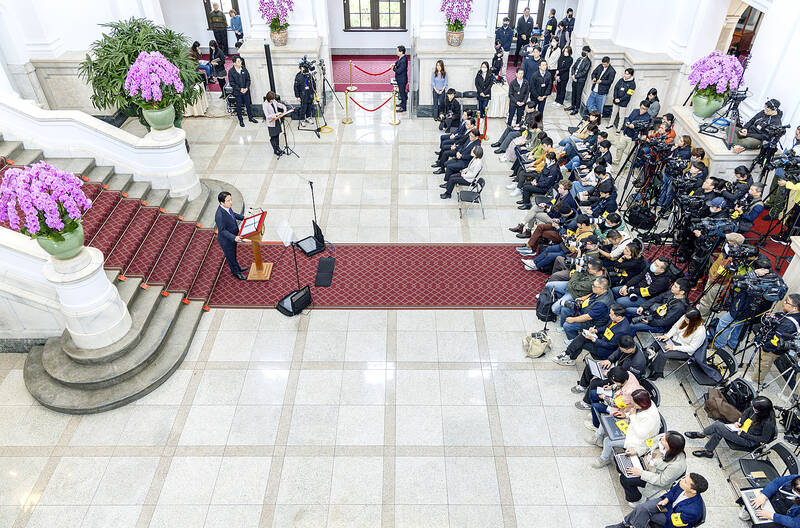The government aims to increase defense spending to at least 3 percent of GDP this year, President William Lai (賴清德) said yesterday, hours after US President Donald Trump again threatened tariffs on Taiwanese semiconductors.
At a news conference in Taipei following his first high-level national security meeting this year, Lai said the government would propose a special budget this year to increase the nation’s defense spending to more than 3 percent of GDP.
“Taiwan must firmly safeguard its national sovereignty, strengthen its resolve for self-defense and bolster its defense capabilities,” he said.

President William Lai, left, speaks at a news conference after a security meeting about US President Donald Trump’s tariff plans at the Presidential Office in Taipei yesterday.
Photo: Presidential Office via AP
The president also vowed to double down on defense reforms and enhance civil protections in the face of growing threats from authoritarian regimes.
Lai’s plans to increase defense spending — which, if successful, would likely see Taipei purchasing more defense articles from Washington — reflects Taipei’s broader efforts to reduce the trade deficit with the US.
The US has approved US$26.26 billion of arms sales to Taiwan over the past eight years, with US$18.76 being approved during Trump’s first term from 2017 to 2021, Lai said.
Taiwan will accelerate efforts to strengthen its national defense capabilities, building on years of close collaboration between Taipei and Washington, he added.
Asked if he was concerned Taiwan could become a “pawn” in the US-China competition, Lai said the nation was “an indispensable member of the world and the region.”
“We are a player, not a pawn,” he said.
His remarks came just hours after Trump, speaking with reporters in Washington after signing a presidential memorandum paving the way for tariffs on US chip imports, reiterated his claim that Taiwan “took our [the US’] chip business away.”
Trump said that the pledged economic sanctions, which could take effect as early as April, would ensure “fair” and “reciprocal” trade, while reducing the US trade deficit in its dealings with other countries over the years.
Taiwan is in the top 10 list of countries with which the US has a trade deficit.
The plans to increase defense spending followed Trump’s comments during his presidential campaign that Taiwan should increase its defense budget significantly and pay the US for protection against China.
Over the past eight years under former president Tsai Ing-wen (蔡英文), the defense budget incrementally increased from NT$365.8 billion (US$11.2 billion) in 2016 to NT$606.8 billion last year. However, the spending still fell short of the 3 percent of GDP pledged by Tsai.
It remains to be seen whether the government’s pledged defense spending hike, which would require legislative approval, would materialize.
For this fiscal year, the Cabinet had earmarked NT$647 billion for national defense, amounting to 2.45 percent of GDP. However, NT$8.4 billion of that figure has been cut by the opposition-led legislature, with another NT$89.9 billion frozen, according to Directorate-General of Budget, Accounting and Statistics estimates.
The legislature has yet to finalize the central government budget plan it passed on Jan. 21 after adopting numerous budget cuts and freezes.
Source: Taipei Times - 2025/02/15




















